Araby
《阿拉比》的寻“爱之旅
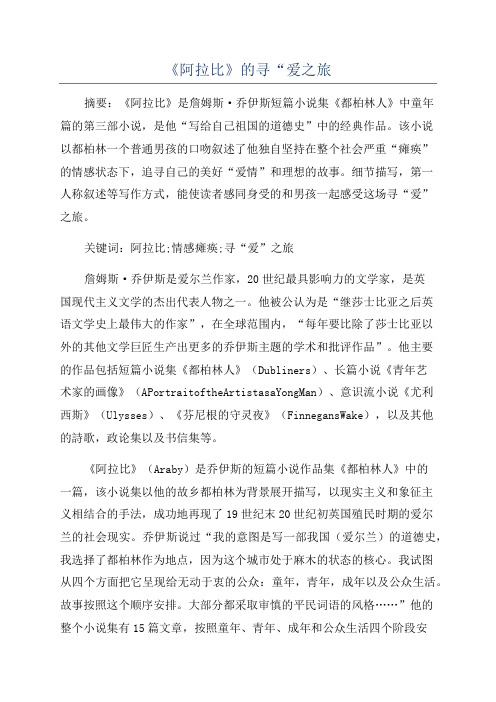
《阿拉比》的寻“爱之旅摘要:《阿拉比》是詹姆斯·乔伊斯短篇小说集《都柏林人》中童年篇的第三部小说,是他“写给自己祖国的道德史”中的经典作品。
该小说以都柏林一个普通男孩的口吻叙述了他独自坚持在整个社会严重“瘫痪”的情感状态下,追寻自己的美好“爱情”和理想的故事。
细节描写,第一人称叙述等写作方式,能使读者感同身受的和男孩一起感受这场寻“爱”之旅。
关键词:阿拉比;情感瘫痪;寻“爱”之旅詹姆斯·乔伊斯是爱尔兰作家,20世纪最具影响力的文学家,是英国现代主义文学的杰出代表人物之一。
他被公认为是“继莎士比亚之后英语文学史上最伟大的作家”,在全球范围内,“每年要比除了莎士比亚以外的其他文学巨匠生产出更多的乔伊斯主题的学术和批评作品”。
他主要的作品包括短篇小说集《都柏林人》(Dubliners)、长篇小说《青年艺术家的画像》(APortraitoftheArtistasaYongMan)、意识流小说《尤利西斯》(Ulysses)、《芬尼根的守灵夜》(FinnegansWake),以及其他的詩歌,政论集以及书信集等。
《阿拉比》(Araby)是乔伊斯的短篇小说作品集《都柏林人》中的一篇,该小说集以他的故乡都柏林为背景展开描写,以现实主义和象征主义相结合的手法,成功地再现了19世纪末20世纪初英国殖民时期的爱尔兰的社会现实。
乔伊斯说过“我的意图是写一部我国(爱尔兰)的道德史,我选择了都柏林作为地点,因为这个城市处于麻木的状态的核心。
我试图从四个方面把它呈现给无动于衷的公众:童年,青年,成年以及公众生活。
故事按照这个顺序安排。
大部分都采取审慎的平民词语的风格……”他的整个小说集有15篇文章,按照童年、青年、成年和公众生活四个阶段安排故事,全面的展示了都柏林人生活的方方面面,体现了当时整个爱尔兰社会萧条、灰暗、冷漠、无趣的氛围,体现了整个社会人的宗教、政治、感情生活的“瘫痪状态”。
二、寻“爱”之旅(一)“爱”的初现(二)“爱”的深化当女孩终于和他说出了第一句话“你是不是准备去阿拉比(Araby)?”他紧张、困惑,甚至忘记了自己有没有回答她。
阿拉比(araby)读后感

阿拉比(araby)读后感
《阿拉比》让我领略了当时伊斯兰文明的繁荣及开放的一面,它的民族特色更显得十分鲜明突出。
这部小说描写了一个男孩贵尼敏在一个异国文明中的旅程,以及他学会接受异文明的新旧之间的冲突。
我被贵尼敏在这种新生活中慢慢找到晰路而自学成才的感叹所折服。
故事也通过他发现这样一个统治者背后的复杂而伟大的章句,让我更加赞叹这一民族创造出来的政治、神学、文明辉煌。
本故事身处几经波折最终历险成功,使我懂得“不怕路长回头短”的道理。
最重要的是,这本小说的作者用美妙的文字隐喻他们的文明,使我的眼睛为之一亮,使我的心灵为之触动。
可以说,这本小说中的主题给了我很大的启发,即坚守正义和不断探索新东西,并拥抱不同文明。
我也因此而深深爱上了这本书和它所包含的文化与历史。
araby中英对照译文
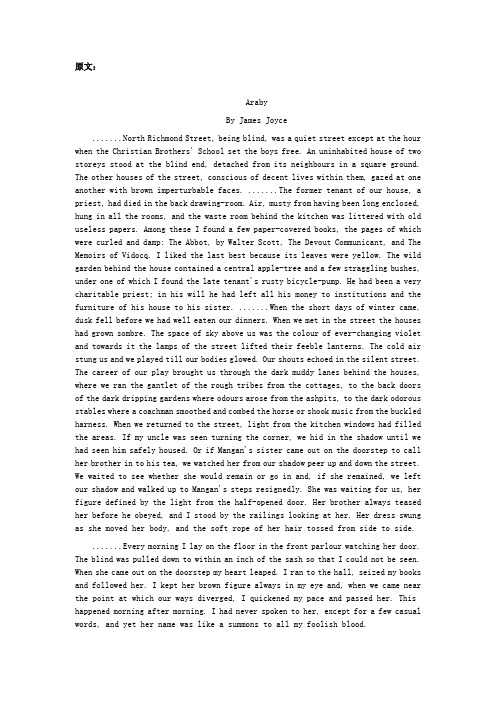
原文:ArabyBy James Joyce.......North Richmond Street, being blind, was a quiet street except at the hour when the Christian Brothers' School set the boys free. An uninhabited house of two storeys stood at the blind end, detached from its neighbours in a square ground. The other houses of the street, conscious of decent lives within them, gazed at one another with brown imperturbable faces. .......The former tenant of our house, a priest, had died in the back drawing-room. Air, musty from having been long enclosed, hung in all the rooms, and the waste room behind the kitchen was littered with old useless papers. Among these I found a few paper-covered books, the pages of which were curled and damp: The Abbot, by Walter Scott, The Devout Communicant, and The Memoirs of Vidocq. I liked the last best because its leaves were yellow. The wild garden behind the house contained a central apple-tree and a few straggling bushes, under one of which I found the late tenant's rusty bicycle-pump. He had been a very charitable priest; in his will he had left all his money to institutions and the furniture of his house to his sister. .......When the short days of winter came, dusk fell before we had well eaten our dinners. When we met in the street the houses had grown sombre. The space of sky above us was the colour of ever-changing violet and towards it the lamps of the street lifted their feeble lanterns. The cold air stung us and we played till our bodies glowed. Our shouts echoed in the silent street. The career of our play brought us through the dark muddy lanes behind the houses, where we ran the gantlet of the rough tribes from the cottages, to the back doors of the dark dripping gardens where odours arose from the ashpits, to the dark odorous stables where a coachman smoothed and combed the horse or shook music from the buckled harness. When we returned to the street, light from the kitchen windows had filled the areas. If my uncle was seen turning the corner, we hid in the shadow until we had seen him safely housed. Or if Mangan's sister came out on the doorstep to call her brother in to his tea, we watched her from our shadow peer up and down the street. We waited to see whether she would remain or go in and, if she remained, we left our shadow and walked up to Mangan's steps resignedly. She was waiting for us, her figure defined by the light from the half-opened door. Her brother always teased her before he obeyed, and I stood by the railings looking at her. Her dress swung as she moved her body, and the soft rope of her hair tossed from side to side........Every morning I lay on the floor in the front parlour watching her door. The blind was pulled down to within an inch of the sash so that I could not be seen. When she came out on the doorstep my heart leaped. I ran to the hall, seized my books and followed her. I kept her brown figure always in my eye and, when we came near the point at which our ways diverged, I quickened my pace and passed her. This happened morning after morning. I had never spoken to her, except for a few casual words, and yet her name was like a summons to all my foolish blood........Her image accompanied me even in places the most hostile to romance. On Saturday evenings when my aunt went marketing I had to go to carry some of the parcels. We walked through the flaring streets, jostled by drunken men and bargaining women, amid the curses of labourers, the shrill litanies of shop-boys who stood on guard by the barrels of pigs' cheeks,the nasal chanting of street-singers, who sang a come-all-you about O'Donovan Rossa, or a ballad about the troubles in our native land. These noises converged in a single sensation of life for me: I imagined that I bore my chalice safely through a throng of foes. Her name sprang to my lips at moments in strange prayers and praises which I myself did not understand. My eyes were often full of tears (I could not tell why) and at times a flood from my heart seemed to pour itself out into my bosom. I thought little of the future. I did not know whether I would ever speak to her or not or, if I spoke to her, how I could tell her of my confused adoration. But my body was like a harp and her words and gestures were like fingers running upon the wires. .......One evening I went into the back drawing-room in which the priest had died. It was a dark rainy evening and there was no sound in the house. Through one of the broken panes I heard the rain impinge upon the earth, the fine incessant needles of water playing in the sodden beds. Some distant lamp or lighted window gleamed below me. I was thankful that I could see so little. All my senses seemed to desire to veil themselves and, feeling that I was about to slip from them, I pressed the palms of my hands together until they trembled, murmuring: `O love! O love!' many times........At last she spoke to me. When she addressed the first words to me I was so confused that I did not know what to answer. She asked me was I going to Araby.I forgot whether I answered yes or no. It would be a splendid bazaar; she said she would love to go. ......."And why can't you?" I asked........While she spoke she turned a silver bracelet round and round her wrist. She could not go, she said, because there would be a retreat that week in her convent. Her brother and two other boys were fighting for their caps, and I was alone at the railings. She held one of the spikes, bowing her head towards me. The light from the lamp opposite our door caught the white curve of her neck, lit up her hair that rested there and, falling, lit up the hand upon the railing. At fell over one side of her dress and caught the white border of a petticoat, just visible as she stood at ease........"It's well for you," she said........"If I go," I said, "I will bring you something.".......What innumerable follies laid waste my waking and sleeping thoughts after that evening! I wished to annihilate the tedious intervening days. I chafed against the work of school. At night in my bedroom and by day in the classroom her image came between me and the page I strove to read. The syllables of the word Araby were called to me through the silence in which my soul luxuriated and cast an Eastern enchantment over me. I asked for leave to go to the bazaar on Saturday night. My aunt was surprised, and hoped it was not some Freemason affair. I answered fewquestions in class. I watched my master's face pass from amiability to sternness; he hoped I was not beginning to idle. I could not call my wandering thoughts together.I had hardly any patience with the serious work of life which, now that it stood between me and my desire, seemed to me child's play, ugly monotonous child's play. .......On Saturday morning I reminded my uncle that I wished to go to the bazaar in the evening. He was fussing at the hallstand, looking for the hat-brush, and answered me curtly: ......."Yes, boy, I know.".......As he was in the hall I could not go into the front parlour and lie at the window. I left the house in bad humour and walked slowly towards the school. The air was pitilessly raw and already my heart misgave me.译文:[爱尔兰]詹姆斯·乔伊斯(1)北里士满街是条死胡同,除了学生放学的时候,这条街从来都是死气沉沉。
araby内容概括及赏析

araby内容概括及赏析今天我来向大家介一片文章 Araby,是Dubliners中的一篇文章。
首先是我篇文章的概述: I had a crush on my friend 's sister.Her name,words gesture were haunted by me whenever and wherever.I promised her would bring something for her when I came back from Araby.After I saw the scenes in Araby and left the bazaar with nothing,I felt anguished and angry.文章当中有很多的环境描写,比如开篇第一段:North Richmond Street,being,blind, was a quiet street except at the hour when the Christmas Brother' s School set the b free. An uninhabited house of two storeys stood at the blind end,detached from its neighbours in a square ground. The other houses of the street,conscious of decent lives within them, gazed at one another with brown imperturbable faces. 段文字描述了一个非常寂静、潮湿、黑暗的环境,开篇就定下了一个悲伤的感情基调。
最后…The upper part of the hall was now completely dark.Gazing up into the darkness同样,以凄凉、黑暗的境渲染了作者内心的痛苦。
阿拉比赏析读后感Araby
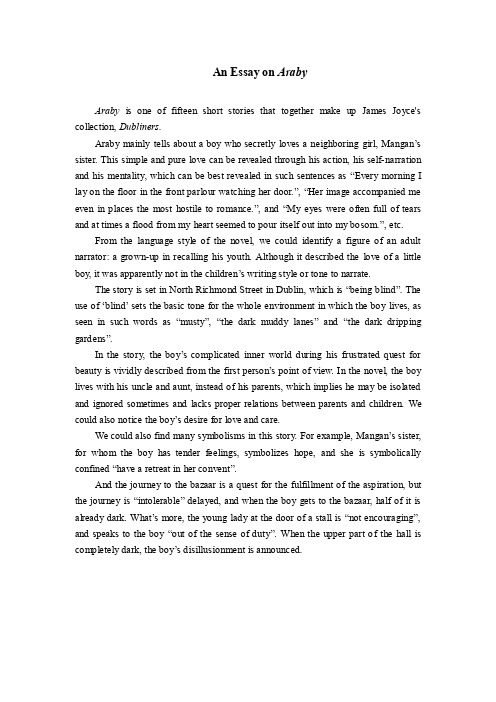
An Essay on ArabyAraby is one of fifteen short stories that together make up James Joyce's collection, Dubliners.Araby mainly tells about a boy who secretly loves a neighboring girl, Mangan‟s sister. This simple and pure love can be revealed through his action, his self-narration and his mentality, which can be best revealed in such sentences as“Every morning I lay on the floor in the front parlour watching her door.”, “Her image accompanied me even in places the most hostile to romance.”, and “My eyes were often full of tears and at times a flood from my heart seemed to pour itself out into my bosom.”, etc.From the language style of the novel, we could identify a figure of an adult narrator: a grown-up in recalling his youth. Although it described the love of a little boy, it was apparently not in the children‟s writing style or tone to narrate.The story is set in North Richmond Street in Dublin, which is “being blind”. The use of …blind‟ sets the basic tone for the whole environment in which the boy lives, as seen in such words as “musty”, “the dark muddy lanes”and “the dark dripping gardens”.In the story, the boy‟s complicated inner world during his frustrated quest for beauty is vividly described f rom the first person‟s point of view. I n the novel, the boy lives with his uncle and aunt, instead of his parents, which implies he may be isolated and ignored sometimes and lacks proper relations between parents and children. We could also notice the boy‟s desire for love and care.We could also find many symbolisms in this story. For example, Mangan‟s sister, for whom the boy has tender feelings, symbolizes hope, and she is symbolically confined “have a retreat in her convent”.And the journey to the bazaar is a quest for the fulfillment of the aspiration, but the journey is “intolerable” delayed, and when the boy gets to the bazaar, half of it is already dark. What‟s more, the young lady at the door of a stall is “not encouraging”, and speaks to the boy “out of the sense of duty”. When the upper part o f the hall is completely dark, the boy‟s disillusionment is announced.Araby" is a short story by James Joyce published in his 1914 collection Dubliners.The unnamed protagonist in "Araby" is a boy who is just beginning to come into his sexual identity. Through his first-person narration, we are immersed at the start of the story in the drab life that people live on North Richmond Street, which seems to be illuminated only by the verve and imagination of the children who, despite the growing darkness that comes during the winter months, insist on playing "until [their] bodies glowed." Even though the conditions of this neighbourhood leave much to be desired, the children’s play is infused with their almost magical way of perceiving the world, which the narrator dutifully conveys to the reader:“ Our shouts echoed in the silent street. The career of our play brought us through the dark muddy lanes behind the houses where we ran the gauntlet of the rough tribes from the cottages, to the back doors of the dark dripping gardens where odours arose from the ashpits, to the dark odorous stables where a coachman smoothed and combed the horse or shook music from the buckled harness. ”But though these boys "career" around the neighbourhood in a very childlike way, they are also aware of and interested in the adult world, as represented by their spying on the narrator’s uncle as he come home from work and, more importantly, on Mangan’s sister, whose dress “swung as she moved” and whose “soft rope of hair tossed from side to side.” These boys are on the brink of sexual awareness and, awed by the mystery of the opposite sex, are hungry for knowledge.On one rainy evening, he secludes himself in a soundless, dark drawing-room and gives his feelings for her full release: "I pressed the palms of my hands together until they trembled, murmuring: O love! O love! many times." This scene is the culmination of the narrator’s increasingly romantic idealization of Mangan’s sister. By the time he actually speaks to her, he has built up such an unrealistic idea of her that he can barely put sentences together: “When she addressed the first words to me I was so confused that I did not know what to answer. She asked me if I was going to Araby. I forget whether I answered yes or no.” But the narrator recovers splendidly: when Mangan’s sister dolefully states that she will not be able to go to Araby, he gallantly offers to bring something back for her.The narrator now cannot wait to go to the Araby bazaar and procure for his belo ved some grand gift that will endear him to her. And though his aunt frets, hoping that it is not “some Freemason affair,” and though his uncle, perhaps intoxicated, perhaps stingy, arrives so late from work and equivocates so much that he almost keeps the narrator from being able to go, the intrepid narrator heads out of the house, tightly clenching a florin and, in spite of the late hour, toward the bazaar.But the Araby market turns out not to be the most fantastic place he had hoped it would be. It is late; most of the stalls are closed. The only sound is "the fall of coins" as men count their money. Worst of all, however, is the vision of sexuality -- of his future -- that he receives when he stops at one of the few remaining open stalls. The young woman minding the stall is engaged in a conversation with two young men. Though he is potentially a customer, she only grudgingly and briefly waits on him before returning to her frivolous conversation. His idealized vision of Araby is destroyed, along with his idealized vision of Mangan’s sister: and of love. With shame and anger rising within him, he exits the bazaar双城记英语读后感1After reading "A tale of two cities""A tale of two cities" is one of Dickens's most important representative w orks.The novel profoundly exposed the society contradiction before the French R evolution,intensely attacks the aristocratic social class is dissolute and crue l,and sincerely sympathizes with the depressed classes.The novel also described many magnificent scenes like the revolt people attacked Bastille and so on,whi ch displayed people's great strength. The novel has portrayed many differe nt people. Doctor Manette is honest and kind but suffers the persecution actual ly , Lucie is beautiful and gentle ,Charles is graceful and noble,Lorry is u pright and honest ,Sydney is semblance of indifferent, innermost feelings of w arm,unconventional but also selfless and lofty,Miss Pross is straightforward a nd loyal,Evremonde brothers are cruel and sinister......The complex hatred is hard to solve, the cruel revenge has made more hatreds, loves rebirth in the he ll edge,but take the life as the price. As an outstanding writer,in Dicken s's work,the language skill is essential.Each kind of rhetoric technique,like t he analogy,the exaggeration,the contrast,the humorous,and the taunt are handled skillfully,and the artistry of the work is also delivered the peak."A tale oftwo cities" has its difference with the general historical novel, its character and the main plot are all fictionalizes.With the broad real background of the French Revolution,the author take the fictional character Doctor Manette's expe rience as the main clue,interweaves the unjust charge, love and revenge three i ndependences but also incident cross-correlation stories together,the plot is c riss-crossed,and the clue is complex.The author use insert narrates,foreshadowi ng,upholstery and so many techniques,causes the structure integrity and strictn ess,the plot winding anxious and rich of theatrical nature,it displayed the rem arkable artistic skill.the style "A tale of two cities" is solemnity and melan choly,fills indignantion,but lacks the humor of the early works.双城记读后感 2A TALE OF TWO CITIESThe tale of two cities is a historical story, one of Dickens’ long fiction s.The background to the novel is the revolution of France .It portrayed a bruta l and bloody story , but it also contained love and friendship.In the novel, Dickens sarcastically described a typical cruel nobleman—mar quis of Evermonde . When he was young he and his brother stole a countrywoman b y force and killed her family .What’s worse , he used his power to imprison Dr Manette , a kind and honest man who knew all the things they had done and wanted to disclose their crimes . In order to hide their crimes. Marquis of Evermonde and his brother threw Doctor Manette into prison for 18 years . During these18 years,Doctor Manette lost his freedom and suffer a great in spirit .I felt unthinkable that Marquis of Evermonde and his brother killed people just as easily as they killed chickens. They deprived other people’s freedom a s they liked and they thought it was normal and unremarkable. They had never re alized that they had done something wrong or something improper. Because their nature was cruel and evil, like demons. There is an old saying which means: Peo ple who commit too many crimes will kill themselves. After all, there is justic e in the world. The demons can’t be rampa nt forever. Because the world will no t forgive them. They will pay their lives for their crimes. Let’s see the cons equence of the Marquis,’’He lay there like a stone with a knife pushed into h is heart.” I think it was just what he ought to gain and it is a real exciting scene.The Marquis’ death was just the beginning of people’s resistance to the n obleman. Gradually more and more people joined in the revolution. One after ano ther nobleman were sentenced to death and their heads were cut down . However, some innocent people were implicated in the revolution. Charles Darney was one of them He was the nephew of Marquis of Evermonde. To the opposite of his uncle, Darney was a kind and independent young man.Dickens spoke highly of kindness mercy and love in the novel too. This is t he other thone of the novel when Doctor Manette was released from prison. It wa s his daughter Lucie who took care of him and helped him return to normal. Duri ng this time, Dr manette and Lucie knew Charles Darney and Sydeny Carton, the t wo young man fell in love with Lucie at the same time . At last, Lucie married Chares Darney .Dr Manette accepted Darney as his son-in-law although he knew th at Darney was the nephew of the man who threw him into prison for18 years. This is the love between father and daughter. And Sydeny Carton , the very great ma n ,loved Lucie deeply. He promised Lucie that he would do everything for her ha ppiness. He did it truely ,he sacrificed himself instead of Darney who looked t he same as him. This is love for lovers . This is the most wonderful thing in t he world. It also reminds us that no matter how no matter when there is true lo ve existing. At the end , Lucie, Dr Manette and Darney arrived in England safel y.The tale of two cities is different from other historical fictions. Its cha racters and main plots are fictional under the real background of the revolutio n of France. The author made the experience of the fictional charactor Dr Manet te as the main clue.The plots are complicated, and they are flexuous and dramat ic. The structure is complete and rigorous.Dickens had dear love and hate. He praised those who ought to be praised an d attacked those who ought to be attacked. The motivation of the novel maybe ju st warn the English dominators. But I think we can learn something meaningful f rom the tale of two cities.The Independent Spirit——about“ Jane Eyer”This is a story about a special and unreserved woman who has been exposed to a hostile environment but continuously and fearlessly struggling for her ideal life. The story can be interpreted as a symbol of the independent spirit.It seems to me that many readers’ English reading experience starts with Jane Eyer. I am of no exception. As we refer to the movie “Jane Eyer”, it is notsurprising to find some differences because of its being filmized and retold in a new way, but the spirit of the novel remains----to be an independent person, both physically and mentally.Jane Eyer was a born resister, whose parents went off when she was very young, and her aunt,the only relative she had,treated her as badly as a ragtag. Since Jane’s education in Lowwood Orphanage began, she didn’t get what she had been expecting——simply being regarded as a common person, just the same as any other girl around. The suffers from being humiliated and devastated teach Jane to be persevering and prize dignity over anything else.As a reward of revolting the ruthless oppression, Jane got a chance to be a tutor in Thornfield Garden. There she made the acquaintance of lovely Adele and that garden’s owner, Rochester, a man with warm heart despite a cold face outside. Jane expected to change the life from then on, but fate had decided otherwise: After Jane and Rochester fell in love with each other and got down to get marry, she unfortunately came to know in fact Rochester had got a legal wife, who seemed to be the shadow following Rochester and led to his moodiness all the time ----Rochester was also a despairing person in need of salvation. Jane did want to give him a hand, however, she made up her mind to leave, because she didn’t want to betray her own principles, because she was Jane Eyer. The film has finally got a symbolist end: Jane inherited al arge number of legacies and finally returned. After finding Rochester’s misfortune brought by his original mad wife, Jane chose to stay with him forever.I don’t know what others feel, but frankly speaking, I would rather regard the section that Jane bega n her teaching job in Thornfield as the film’send----especially when I heard Jane’s words “Never in my life have I been awaken so happily.” For one thing, this ideal and brand-new beginning of life was what Jane had been imagining for long as a suffering person; for another, this should be what the audiences with my views hoped her to get. But the professional judgment of producing films reminded me to wait for a totally different result: There must be something wrong coming with theexcellence----perhaps not only should another section be added to enrich the story, but also we may see from the next transition of Jane’s life that “Life is like a box of chocolates, you never know what you would get.” (By Forrest Gump’s mother, in the film “Forrest Gump”)Wh at’s more, this film didn’t end when Jane left Thornfield. For Jane Eyer herself, there should always be somewhere to realize her great ideal of being independent considering her fortitude, but for Rochester, how he can get salvation? The film gives the answer tentatively: Jane eventually got back to Rochester. In fact, when Jane met Rochester for the first time, she scared his horse and made his heel strained, to a certain extent, which meant Rochester would get retrieval because of Jane. We can consider R ochester’sexperiences as that of religion meaning. The fire by his frantic wife was the punishment for the cynicism early in his life. After it, Rochester got the mercy of the God and the love of the woman whom he loved. Here we can say: human nature and divinity get united perfectly in order to let such a story accord with the requirements of both two sides. The value of this film may be due to its efforts to explore a new way for the development of humanism under the faith of religion.Life is ceaselessly changing, but our living principles remain. Firmly persisting for the rights of being independent gives us enough confidence and courage, which is like the beacon over the capriccioso sea of life. In the world of the film, we have found the stories of ourselves, which makes us so concerned about the fate of the dramatis personae.In this era of rapid social and technological change leading to increasing life complexity and psychological displacement, both physical and mental effects on us call for a balance. We are likely to find ourselves bogged down in the Sargasso Sea of information overload and living unconsciousness. It’s our spirit that makes the life meaningful.Heart is the engine of body, brain is the resource of thought, and great films are th e mirrors of life. Indubitably, “Jane Eyer” is one of them.。
Araby——James Joyce
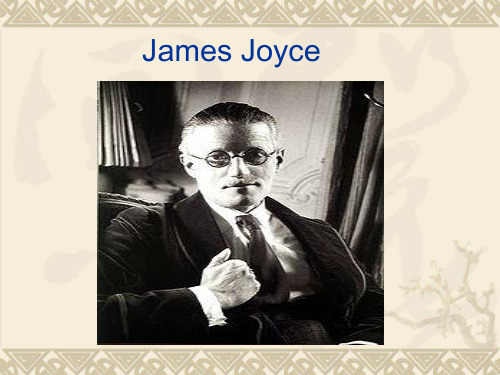
James Joyce
Joyce was born in Dublin, which kept haunting his dream throughout his life. In 1914 he published his most noted short story collection The Dubliners, which is a cycle of stories all set up in the city Dublin. It seems that Joyce was drawing a series of sketches of his fellow countrymen. In each, the detail is so chosen and organized that carefully interacting symbolic meanings are set up, and as a result, The Dubliners is also a book about human fate. A literary experiment, the stories are as refreshingly original and astonishing today, as when they were first published when Joyce was just twenty-five years old. Moreover, the stories are presented in a particular order so that new meanings arise from the relation between them .
简析《阿拉比》的创作手法

简析《阿拉比》的创作手法作者:李秀艳来源:《青年文学家》2013年第21期摘要:詹姆士·乔伊斯(James Joyce )爱尔兰作家,诗人,是20世纪西方现代派文学最重要的作家之一。
乔伊斯的文学生涯始于他1904年开始创作的短篇小说集《都伯林人》。
在写给出版商理查兹的一封信中,他明确地表述了这本书的创作原则:“我的宗旨是要为我国的道德和精神史写下自己的一章。
”这实际上也成了他一生文学追求的目标,作家因此而获得了祖国人民的衷心爱戴。
在乔伊斯笔下,在英国殖民主义和天主教会双重压迫和的爱尔兰是一个不可救药的国家,而都柏林则是它“瘫痪的中心”,在这个城市里充斥着麻木、苦闷、沦落的精神荒漠。
《阿拉比》(Araby)是短篇小说集《都伯林人》中的第三篇。
小说讲述了一个都柏林少年的故事这篇小说语言细腻,创作手法丰富多彩,字里行间透视着人类空洞荒芜的精神世界。
本文将通过细致的文本分析,深入探讨小说中的客观性,淡化的情节,丰富的意象,等现代主义创作手法,从而更好的领略《阿拉比》的现代性艺术魅力。
关键词:创作手法;艺术魅力作者简介:李秀艳,吉林省农安县人。
吉林省延边大学外国语学院英语专业教师,副教授。
担任综合英语课和英语短篇小说课教学工作,研究方向为美国文学。
[中图分类号]:I106.4 [文献标识码]:A[文章编号]:1002-2139(2013)-21-00-02詹姆士·乔伊斯(James Joyce ),著名作家,诗人,1882年生于爱尔兰都柏林一个信奉天主教的家庭,乔伊斯的文学生涯始于他1904年开始创作的短篇小说集《都伯林人》。
在写给出版商理查兹的一封信中,他明确地表述了这本书的创作原则:“我的宗旨是要为我国的道德和精神史写下自己的一章。
”这实际上也成了他一生文学追求的目标,作家因此而获得了祖国人民的衷心爱戴。
在乔伊斯笔下,在英国殖民主义和天主教会双重压迫和的爱尔兰是一个不可救药的国家,而都柏林则是它“瘫痪的中心”,在这个城市里充斥着麻木、苦闷、沦落的精神荒漠。
araby课件ppt

完成特定课程或达到一定学习水平的学生,可以获得ARABY课件 颁发的证书,证明其学习成果和能力。
分享与展示
学生可以将自己的成绩单和证书分享给其他人或展示在个人简历中 ,作为自己努力学习并取得成果的证明。
05
ARABY教师培训和支持
教师资格认证和培训
教师资格认证
ARABY课件的教师需要具备相关的 教育背景和教学经验,并经过严格的 资格认证过程,以确保他们具备足够 的专业知识和教学能力。
03
ARABY教学方法
互动式教学
01
02
03
互动式学习环境
ARABY课件提供互动式学 习环境,使学生能够积极 参与学习过程,提高学习 效果。
实时反馈
通过实时反馈机制,学生 可以及时了解自己的学习 进度和掌握情况,调整学 习策略。
小组协作
鼓励学生进行小组协作, 共同完成任务,培养团队 合作和沟通能力。
阅读和写作技巧
第一季度
第二季度
第三季度
总结词
掌握阅读技巧
详细描述
ARABY课件提供了各 种阅读材料,如文章、 新闻、广告等,通过阅 读练习和阅读理解题, 帮助学生掌握阅读技巧 ,提高阅读速度和理解
能力。
总结词
培养写作技巧
第四季度
详细描述
通过写作练习、范文分 析和写作任务,学生可 以学习不同类型的写作 技巧,如记叙文、议论 文、说明文等。同时提 供写作指导和反馈,帮 助学生改进写作水平。
经过多年的发展和改进,ARABY课件已经成为全球范围内广 泛使用的教育资源,涵盖了多个学科领域,包括科学、历史 、地理等。
ARABY的目标和愿景
01
ARABY的目标是为学生提供一种 生动、有趣的学习体验,激发他 们的学习兴趣和主动性,提高学 习效果。
英国文学课件Araby_的文本
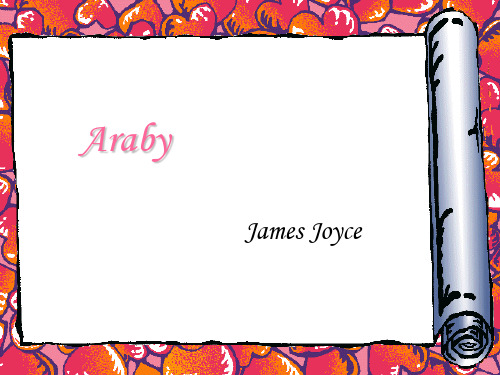
1) The effect of the puppy love on “me”; 2) Vivid description of the vulgar reality
Her image accompanied me even in places the most hostile to romance. On Saturday evenings when my aunt went marketing I had to go to carry some of the parcels. We walked through the flaring streets(穿行在五光十色的街上), jostled by (被…拥挤着)drunken men and bargaining women, amid the curses of laborers, the shrill litanies (刺耳的叫卖声) of shopboys who stood on guard by the barrels of pigs' cheeks(一桶桶猪颊肉旁), the nasal chanting of street singers, who sang a come-all-you (歌颂… 的曲子”大伙儿都来) about O’Donovan Rossa, or a ballad about the troubles in ou现方式做保护处理对用户上传分享的文档内容本身不做任何修改或编辑并不能对任何下载内容负责
Araby
James Joyce
A Brief Summary of “Araby”
A young boy in North Richmond Street hopes to win the affection of his friend Mangan„ sister. One day, the boy, full of romantic notions, promises to go to the Araby, an Orientalist bazaar(一个具有东方风情的集 市) and find some kind of gift for her. With the permission of his uncle to give money to the bazaar, the boy concentrates on the girl, the Araby and the gift he will get for her for days. That night, his uncle is late, so the boy arrives at the bazaar just as it is closing. Only a few stalls(摊位) are open. He examines the goods, but they are far too expensive for him. What the boy finds in his dreamed Araby is nothing but disappointment.
Araby_中英译文
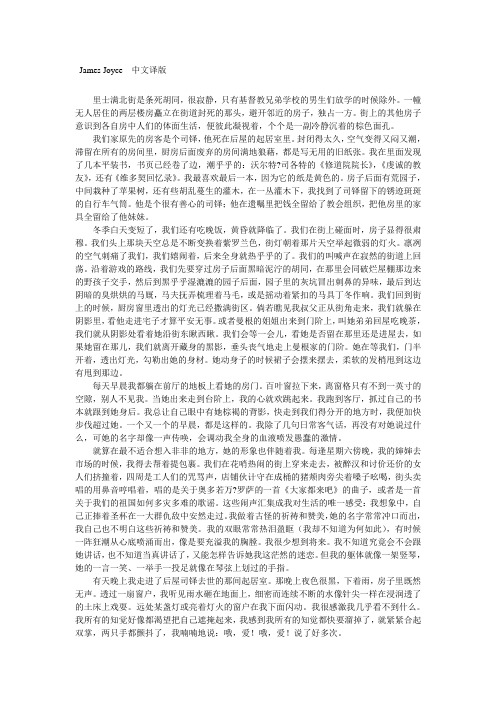
James Joyce 中文译版里士满北街是条死胡同,很寂静,只有基督教兄弟学校的男生们放学的时候除外。
一幢无人居住的两层楼房矗立在街道封死的那头,避开邻近的房子,独占一方。
街上的其他房子意识到各自房中人们的体面生活,便彼此凝视着,个个是一副冷静沉着的棕色面孔。
我们家原先的房客是个司铎,他死在后屋的起居室里。
封闭得太久,空气变得又闷又潮,滞留在所有的房间里,厨房后面废弃的房间满地狼藉,都是写无用的旧纸张。
我在里面发现了几本平装书,书页已经卷了边,潮乎乎的:沃尔特?司各特的《修道院院长》,《虔诚的教友》,还有《维多契回忆录》。
我最喜欢最后一本,因为它的纸是黄色的。
房子后面有荒园子,中间栽种了苹果树,还有些胡乱蔓生的灌木,在一丛灌木下,我找到了司铎留下的锈迹斑斑的自行车气筒。
他是个很有善心的司铎;他在遗嘱里把钱全留给了教会组织,把他房里的家具全留给了他妹妹。
冬季白天变短了,我们还有吃晚饭,黄昏就降临了。
我们在街上碰面时,房子显得很肃穆。
我们头上那块天空总是不断变换着紫罗兰色,街灯朝着那片天空举起微弱的灯火。
凛冽的空气刺痛了我们,我们嬉闹着,后来全身就热乎乎的了。
我们的叫喊声在寂然的街道上回荡。
沿着游戏的路线,我们先要穿过房子后面黑暗泥泞的胡同,在那里会同破烂屋棚那边来的野孩子交手,然后到黑乎乎湿漉漉的园子后面,园子里的灰坑冒出刺鼻的异味,最后到达阴暗的臭烘烘的马厩,马夫抚弄梳理着马毛,或是摇动着紧扣的马具丁冬作响。
我们回到街上的时候,厨房窗里透出的灯光已经撒满街区。
倘若瞧见我叔父正从街角走来,我们就躲在阴影里,看他走进宅子才算平安无事。
或者曼根的姐姐出来到门阶上,叫她弟弟回屋吃晚茶,我们就从阴影处看着她沿街东瞅西瞅。
我们会等一会儿,看她是否留在那里还是进屋去,如果她留在那儿,我们就离开藏身的黑影,垂头丧气地走上曼根家的门阶。
她在等我们,门半开着,透出灯光,勾勒出她的身材。
她动身子的时候裙子会摆来摆去,柔软的发梢甩到这边有甩到那边。
阿拉比译文
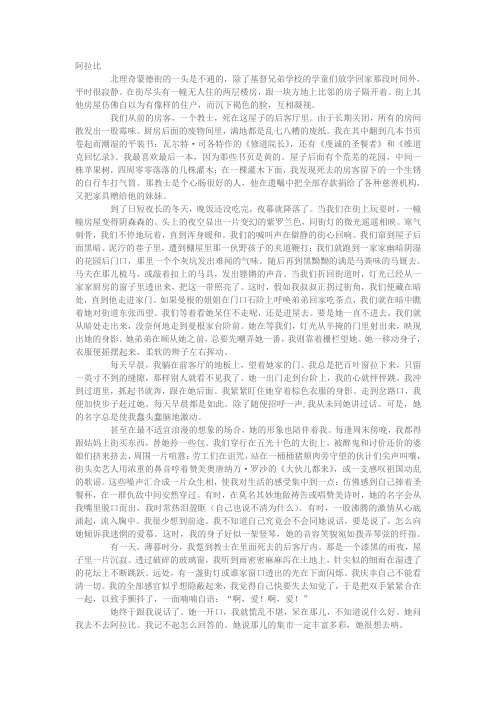
阿拉比北理奇蒙德街的一头是不通的,除了基督兄弟学校的学童们放学回家那段时间外,平时很寂静。
在街尽头有一幢无人住的两层楼房,跟一块方地上比邻的房子隔开着。
街上其他房屋仿佛自以为有像样的住户,而沉下褐色的脸,互相凝视。
我们从前的房客,一个教士,死在这屋子的后客厅里。
由于长期关闭,所有的房间散发出一股霉味。
厨房后面的废物间里,满地都是乱七八糟的废纸。
我在其中翻到几本书页卷起而潮湿的平装书:瓦尔特·司各特作的《修道院长》,还有《虔诚的圣餐者》和《维道克回忆录》。
我最喜欢最后一本,因为那些书页是黄的。
屋子后面有个荒芜的花园,中间一株苹果树,四周零零落落的几株灌木;在一棵灌木下面,我发现死去的房客留下的一个生锈的自行车打气筒。
那教士是个心肠很好的人,他在遗嘱中把全部存款捐给了各种慈善机构,又把家具赠给他的妹妹。
到了日短夜长的冬天,晚饭还没吃完,夜幕就降落了。
当我们在街上玩耍时,一幢幢房屋变得阴森森的。
头上的夜空显出一片变幻的紫罗兰色,同街灯的微光遥遥相映。
寒气刺骨,我们不停地玩着,直到浑身暖和。
我们的喊叫声在僻静的街心回响。
我们窜到屋子后面黑暗、泥泞的巷子里,遭到棚屋里那一伙野孩子的夹道鞭打;我们就跑到一家家幽暗阴湿的花园后门口,那里一个个灰坑发出难闻的气味。
随后再到黑黝黝的满是马粪味的马厩去。
马夫在那儿梳马,或敲着扣上的马具,发出铿锵的声音。
当我们折回街道时,灯光已经从一家家厨房的窗子里透出来,把这一带照亮了。
这时,假如我叔叔正拐过街角,我们便藏在暗处,直到他走进家门。
如果曼根的姐姐在门口石阶上呼唤弟弟回家吃茶点,我们就在暗中瞧着她对街道东张西望。
我们等着看她呆住不走呢,还是进屋去。
要是她一直不进去,我们就从暗处走出来,没奈何地走到曼根家台阶前。
她在等我们,灯光从半掩的门里射出来,映现出她的身影。
她弟弟在顺从她之前,总要先嘲弄她一番,我则靠着栅栏望她。
她一移动身子,衣服便摇摆起来,柔软的辫子左右挥动。
Araby英文讲义
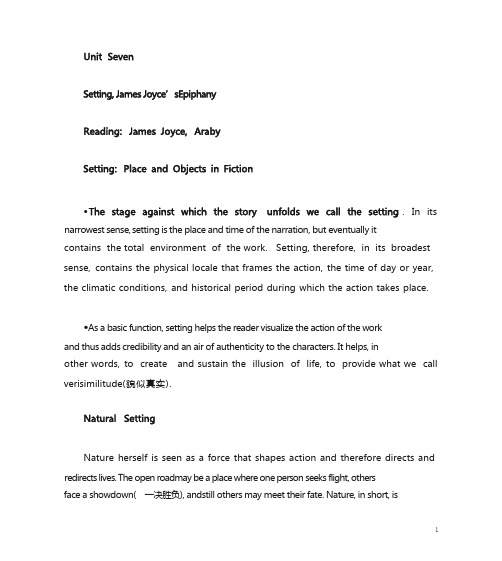
narrowest sense, setting is the place and time of the narration, but eventually itcontains the total environment of the work. Setting, therefore, in its broadest sense, contains the physical locale that frames the action, the time of day or year, the climatic conditions, and historical period during which the action takes place.•As a basic function, setting helps the reader visualize the action of the workand thus adds credibility and an air of authenticity to the characters. It helps, inother words, to create and sustain the illusion of life, to provide what we call verisimilitude(貌似真实).Nature herself is seen as a force that shapes action and therefore directs and redirects lives. The open roadmay be a place where one person seeks flight, othersface a showdown( 一决胜负), andstill others may meet their fate. Nature, in short, isone of the major forces puttingunder control the circumstances of characters whogo about facing the conflicts on which the plots of stories depend.Manufacturedthings always reflect the people whomake them. A buildingora room tells about those who built it and live in it, and ultimately about the social and political orders that maintain the conditions. A richly-decorated house shows the expensive tastes and resources of the characters owning it. A few cracks in the plaster and some chips in the paint may show the same persons declining in fortune and power. Ugly and impoverished surroundings may contribute to the weariness, insensitivity, negligence, or even hostility of the characters living in them.Everything happens somewhere. Sometimes this background is extensive and highly developed. In other cases, including many modern stories, setting is so slight that it can be presented with in a single sentence or must be inferred altogether from dialogue and action. When we speak of setting as background,then, we have in mind a kind of setting that exists largely for its own sake, without necessary relationship to action and characters,or at best a relationship that is only insignificant and slight.Often, the forces of nature function as a causal agent or antagonist, helpingtoestablish conflict and to determine the outcome of events. Washington Square may be conceived of as an example of a setting that functions as antagonist, inthat there were many other people getting in the way of the reconciliation between the two characters.Many authors manipulate their settings as a means of arousing the reader’s expectations and establishing an appropriate state of mind for events to come.Very often the way in which a character perceives the setting, and the way he or she reacts toit, will tell the reader more about the character andhis or her stateof mind than it will about the setting itself.This is particularly true of works in which the author carefully controls the point of view. The “blind” Richmond Street and the “”imperturbable” houses in the c“old” and “quiet” lanes perfectly mirrors the narrator’s growing sense of isolation, loneliness, frustration, and confusion.An author can also clarify andreveal character by deliberately makingsettinga metaphoric or symbolic extension of character. A case in point is found in thechicken raising farm, a setting of disaster, as shown in Sherwood Anderson’s The Egg Setting and character are one: the house objectifies, and in this way serves to clarify, its master.Setting can also be used as a means of reinforcing and clarifying the theme of a novel or short story. In The Egg, Hills Like White Elephants, Early Autumn, all the settings have contributed to the clarification of the themes of the stories.By an epiphany James Joyce meant a sudden spiritual manifestation. Writersreveal a search for meaning and identity by their characters, who often achieve awareness by means of epiphany, moments of sudden illumination or revelation.– 13 January 1941) was anIrish novelist and poet, considered to be one of the most influential writers in the modernist avant-garde of the early 20th century.The streamof consciousness technique culminates itself in the novels of JamesJoyce.His psychological perceptions and masterly use of the interior monologue, as demonstrated in his novel Ulysses, win him a fame that very few other writerscan achieve.Joyce was born in Dublin, Ireland. His father was a landowner. He was educated at University College, Dublin. He was deeply impressed by Ibsen’s new approach to drama. Joyce once intended to become a priest, but he later rebelled against Catholicism and left Dublin when he was twenty.Joyce’scareer as a writer started with a collection of thirty -six love poems entitled Chamber Music (1907). His first major work was Dubliners (1914), a collection of fifteen short stories dealing successively with events of childhood, youth and adulthood. As the title indicates, Joyce made Ireland the focus of hisstories. M“y intention was towrite a chapter of the moral history of my country,”wrote Joyce to his publisher about this book, nd I chose Dublin for the scenebecause the city seemed tome tobe the centre of paralysis. ”’s spiritual growth. All characters in the storiesstruggle, in one way or another, with oppressive morality, personal frustrations, or restless desires. They are ordinary people involvedin various minor yet meaningfulevents in everyday life.Often,these characters are on the brink of discovering something, such as loss, shame, failure, or death. These stories contain no melodramatic(情节剧的) conflicts; instead, they present those quiet moments in the characters’lives when they come to a sudden realization of the meaning oftheir existence (an epiphany).1. How do you look at the first paragraph?2. A great part of th e story does not directly concern itself with the boy’sloveaffair,but with the world in which he lives ---the description of the street,the information about the dead priest, etc. What function do these items have?3. What are the chief qualities of the narrator’s character? How are these emphasized by the feelings and behavior directed towards Mangan’s sister?4. How do you understand the clause: “I imagined that I bore my chalice safely through a throng of foes”?5. Children are supposed to have more imagination than adults. What has happened when, for the boy, his previous occupations seem to be “ugly monotonous child’splay”?6. What is thecharacter of theuncle, andhow does heaffect theboy’swishesand feelings?7. Is anything gained by the narrator through his frustration and humiliation?8. There is in this story a relatively small amount of dramatically rendered material. Can you say why? Is this fact consistent with the general tone and meaning of the story?9. What do you find to be the theme of this story?10. Mention one remarkable technique Joyce adopted in the writing and illustrate it with examples.。
乔伊斯《都柏林人》中《阿拉比》的象征主义解析[权威资料]
![乔伊斯《都柏林人》中《阿拉比》的象征主义解析[权威资料]](https://img.taocdn.com/s3/m/7dadc83fbc64783e0912a21614791711cc797974.png)
乔伊斯《都柏林人》中《阿拉比》的象征主义解析本文档格式为WORD,感谢你的阅读。
摘要:爱尔兰小说家詹姆斯・乔伊斯在现代文学史上占据重要地位,《都柏林人》是他创作的一部短篇小说集,在这部短篇小说集的每一个故事里,作家匠心独具地运用了象征主义手法,文章无不具有象征,力图把象征或隐喻的意义紧密相连。
《阿拉比》是《都柏林人》的第三个故事。
许多人已从不同的角度对这部暗含深意的作品进行了极为丰富的解读。
本文从象征主义文学的角度,对这部作品中的象征主义特征予以解析。
关键词:乔伊斯;象征主义文学;阿拉比一、象征主义文学19世纪中叶,象征主义文学在法国兴起,20世纪初期波及到欧美各国,是现代主义文学中出现最早和影响最大的一个流派。
象征主义文学的出现具有划时代的意义,被西方主流学术界看作古典文学和现代文学的分水岭,其对当代文学仍有着不可忽视的影响力。
象征主义的先锋人物是法国诗人夏尔・波德莱尔和美国诗人爱伦・坡他们在19世纪中叶的创作中就涉及到了一些象征主义的理念。
1886年9月15号《费加罗报》上诗人莫雷阿斯首次象征主义在法国正式打出旗号,尼采、弗洛伊德和柏格森的思想被认为是象征主义的哲学基础,象征主义者主张发掘隐藏于自然界背后的理念世界,依靠个人的敏感和想象力去创造超越自然的艺术。
象征主义最基本的特征是用象征来暗示作品的思想和事物的发展。
在取材方面,象征主义者主张取材于平庸的日常生活,通过对平庸事物的描绘来侧重描写个人幻影和内心感受,对社会题材较少涉及;在艺术方法上,象征主义者反对使用空洞的修辞和生硬的说教,强调使用幻象、暗示、对比、联想等方法进行文学创作,提倡“要把人们的注意力从外部世界引向人的内部精神世界去探求内心的最该真实,赋予抽象思想以具体形式”。
[1]同时,象征主义文学与音乐有着某种密切的联系,使得读者在作品中体会到美妙的音乐性和韵律感。
二、乔伊斯与《阿拉比》詹姆斯乔・伊斯是伟大爱尔兰现代主义小说家之一,他的第一部及唯一一部短篇小说集就是《都柏林人》,以爱尔兰首都都柏林为背景,生动地描绘了二十世纪初都柏林市井百姓形形色色的真实生活,并深刻地揭示了弥漫于整个社会生活中的一种麻木不仁、死气沉沉的瘫痪状态。
Araby文学课件
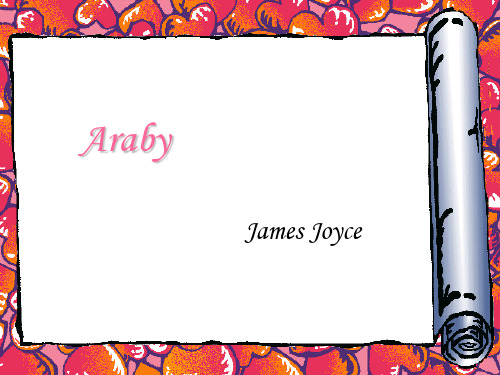
The miserable waiting
When I came home to dinner my uncle had not yet been home. Still it was early. I sat staring at the clock for some time and ,when its ticking began to irritate me ,I left the room. I mounted the staircase and gained the upper part of the house. The high cold empty gloomy rooms liberated me and I went from room to room singing.
Araby
James Joyce
A Brief Summary of “Araby”
A young boy in North Richmond Street hopes to win the affection of his friend Mangan‘ sister. One day, the boy, full of romantic notions, promises to go to the Araby, an Orientalist bazaar(一个具有东方风情的 集市) and find some kind of gift for her. With the permission of his uncle to give money to the bazaar, the boy concentrates on the girl, the Araby and the gift he will get for her for days. That night, his uncle is late, so the boy arrives at the bazaar just as it is closing. Only a few stalls(摊位) are open. He examines the goods, but they are far too expensive for him. What the boy finds in his dreamed Araby is nothing but disappointment.
Araby赏析
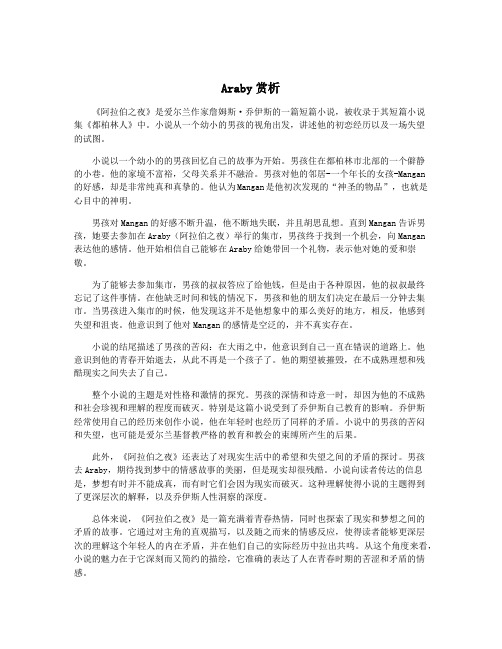
Araby赏析《阿拉伯之夜》是爱尔兰作家詹姆斯·乔伊斯的一篇短篇小说,被收录于其短篇小说集《都柏林人》中。
小说从一个幼小的男孩的视角出发,讲述他的初恋经历以及一场失望的试图。
小说以一个幼小的的男孩回忆自己的故事为开始。
男孩住在都柏林市北部的一个僻静的小巷。
他的家境不富裕,父母关系并不融洽。
男孩对他的邻居-一个年长的女孩-Mangan的好感,却是非常纯真和真挚的。
他认为Mangan是他初次发现的“神圣的物品”,也就是心目中的神明。
男孩对Mangan的好感不断升温,他不断地失眠,并且胡思乱想。
直到Mangan告诉男孩,她要去参加在Araby(阿拉伯之夜)举行的集市,男孩终于找到一个机会,向Mangan表达他的感情。
他开始相信自己能够在Araby给她带回一个礼物,表示他对她的爱和崇敬。
为了能够去参加集市,男孩的叔叔答应了给他钱,但是由于各种原因,他的叔叔最终忘记了这件事情。
在他缺乏时间和钱的情况下,男孩和他的朋友们决定在最后一分钟去集市。
当男孩进入集市的时候,他发现这并不是他想象中的那么美好的地方,相反,他感到失望和沮丧。
他意识到了他对Mangan的感情是空泛的,并不真实存在。
小说的结尾描述了男孩的苦闷:在大雨之中,他意识到自己一直在错误的道路上。
他意识到他的青春开始逝去,从此不再是一个孩子了。
他的期望被摧毁,在不成熟理想和残酷现实之间失去了自己。
整个小说的主题是对性格和激情的探究。
男孩的深情和诗意一时,却因为他的不成熟和社会珍视和理解的程度而破灭。
特别是这篇小说受到了乔伊斯自己教育的影响。
乔伊斯经常使用自己的经历来创作小说,他在年轻时也经历了同样的矛盾。
小说中的男孩的苦闷和失望,也可能是爱尔兰基督教严格的教育和教会的束缚所产生的后果。
此外,《阿拉伯之夜》还表达了对现实生活中的希望和失望之间的矛盾的探讨。
男孩去Araby,期待找到梦中的情感故事的美丽,但是现实却很残酷。
小说向读者传达的信息是,梦想有时并不能成真,而有时它们会因为现实而破灭。
梦想与现实的差距——《阿拉比》的结构主义解读
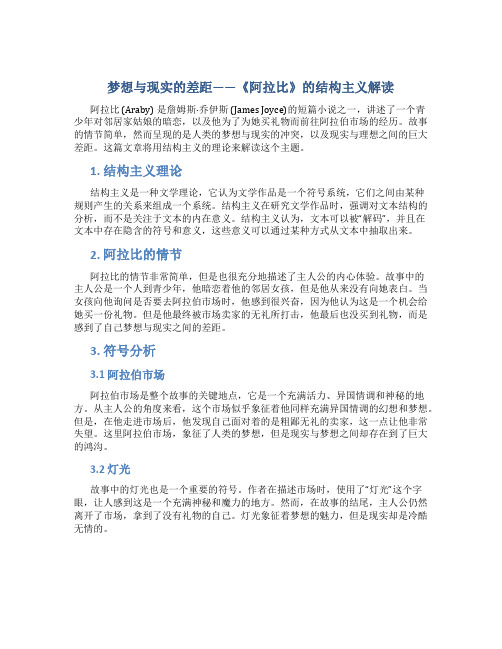
梦想与现实的差距——《阿拉比》的结构主义解读阿拉比 (Araby) 是詹姆斯·乔伊斯 (James Joyce)的短篇小说之一,讲述了一个青少年对邻居家姑娘的暗恋,以及他为了为她买礼物而前往阿拉伯市场的经历。
故事的情节简单,然而呈现的是人类的梦想与现实的冲突,以及现实与理想之间的巨大差距。
这篇文章将用结构主义的理论来解读这个主题。
1. 结构主义理论结构主义是一种文学理论,它认为文学作品是一个符号系统,它们之间由某种规则产生的关系来组成一个系统。
结构主义在研究文学作品时,强调对文本结构的分析,而不是关注于文本的内在意义。
结构主义认为,文本可以被“解码”,并且在文本中存在隐含的符号和意义,这些意义可以通过某种方式从文本中抽取出来。
2. 阿拉比的情节阿拉比的情节非常简单,但是也很充分地描述了主人公的内心体验。
故事中的主人公是一个人到青少年,他暗恋着他的邻居女孩,但是他从来没有向她表白。
当女孩向他询问是否要去阿拉伯市场时,他感到很兴奋,因为他认为这是一个机会给她买一份礼物。
但是他最终被市场卖家的无礼所打击,他最后也没买到礼物,而是感到了自己梦想与现实之间的差距。
3. 符号分析3.1 阿拉伯市场阿拉伯市场是整个故事的关键地点,它是一个充满活力、异国情调和神秘的地方。
从主人公的角度来看,这个市场似乎象征着他同样充满异国情调的幻想和梦想。
但是,在他走进市场后,他发现自己面对着的是粗鄙无礼的卖家,这一点让他非常失望。
这里阿拉伯市场,象征了人类的梦想,但是现实与梦想之间却存在到了巨大的鸿沟。
3.2 灯光故事中的灯光也是一个重要的符号。
作者在描述市场时,使用了“灯光”这个字眼,让人感到这是一个充满神秘和魔力的地方。
然而,在故事的结尾,主人公仍然离开了市场,拿到了没有礼物的自己。
灯光象征着梦想的魅力,但是现实却是冷酷无情的。
3.3 停车场在故事的结尾,主人公意识到自己所处的地方已经不是阿拉伯市场了,而是一个停车场。
araby读后感英文
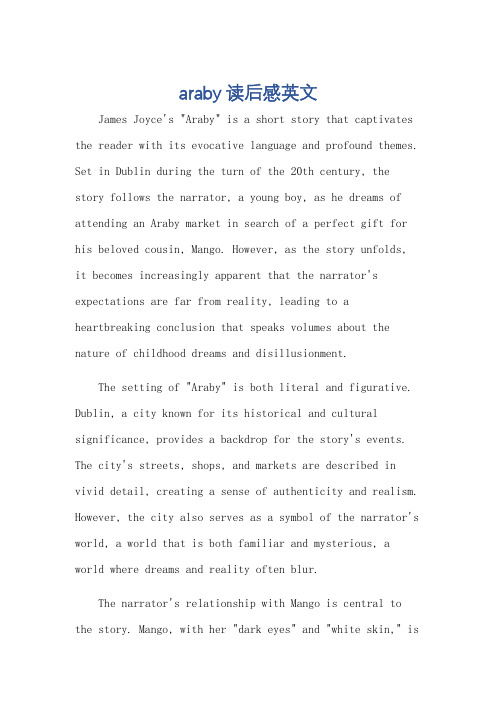
araby读后感英文James Joyce's "Araby" is a short story that captivates the reader with its evocative language and profound themes. Set in Dublin during the turn of the 20th century, the story follows the narrator, a young boy, as he dreams of attending an Araby market in search of a perfect gift for his beloved cousin, Mango. However, as the story unfolds, it becomes increasingly apparent that the narrator's expectations are far from reality, leading to a heartbreaking conclusion that speaks volumes about the nature of childhood dreams and disillusionment.The setting of "Araby" is both literal and figurative. Dublin, a city known for its historical and cultural significance, provides a backdrop for the story's events. The city's streets, shops, and markets are described in vivid detail, creating a sense of authenticity and realism. However, the city also serves as a symbol of the narrator's world, a world that is both familiar and mysterious, a world where dreams and reality often blur.The narrator's relationship with Mango is central to the story. Mango, with her "dark eyes" and "white skin," isthe idealized object of the narrator's affection. He views her as perfect, as someone who embodies all his dreams and aspirations. His desire to find a perfect gift for her at the Araby market reflects his desire to please her and win her approval. However, as the story progresses, it becomes clear that Mango is not as perfect as the narrator had imagined. Her flaws and imperfections shatter his illusions, leaving him feeling disappointed and betrayed.The Araby market itself is a symbol of the narrator's dreams and aspirations. He imagines it as a magical place where he can find the perfect gift that will win Mango's heart. However, when he finally arrives at the market, he finds it to be a disappointing and even surreal experience. The shops are empty, the streets are deserted, and the atmosphere is far from the bustling and vibrant market he had envisioned. This contrast between the narrator's expectations and reality is a powerful testament to the disillusioning nature of childhood dreams.The ending of "Araby" is particularly heartbreaking. As the narrator returns home, he realizes that Mango has already forgotten about the gift he had intended to giveher. This moment of realization is both a moment of liberation and a moment of heartbreak. The narrator finally realizes that his dreams and aspirations are not rooted in reality, but in his own imagination. However, this realization comes at a cost: he has lost the innocence and idealism of childhood, replaced by a sense of cynicism and disillusionment."Araby" is a profound exploration of childhood dreams and disillusionment. Through the narrator's journey, we are reminded that while dreams can be powerful motivators, they can also lead to disappointment and heartbreak. The story teaches us that while it is important to dream and aspire, it is also crucial to maintain a sense of realism and groundedness. Otherwise, we may find ourselves lost in a world of illusions, unable to distinguish between what is real and what is merely a figment of our imagination.**《阿拉比》读后感:童年的梦想与幻灭**詹姆斯·乔伊斯的短篇小说《阿拉比》以其生动的语言和深刻的主题深深吸引了读者。
araby单词句子部分.

contain [kən'teɪn] vi. 含有;自制 vt. 包含;控制;容纳;牵制(敌军) straggling ['strægl] n. 歧离;离散 adj. 落后的;离散的;脱离队伍的 v. 掉队;落伍(straggle的ing形式)
charitable ['tʃærɪtəb(ə)l] adj. 慈善事业的;慷慨的,仁慈的; 宽恕的 institution [ɪnstɪ'tjuːʃ(ə)n] n. 制度;建立;(社会或宗教等)公 共机构;习俗
echoed 重复
gauntlet ['gɔːntlɪt] n. 长手套;(古时士兵戴的)金属护手; 夹道鞭笞的刑罚;交叉射击;严酷考验
odorous ['əʊd(ə)rəs] adj. 香的;有气味的;难闻的 combed n. 精梳 v. 梳理;梳头;到处搜寻(comb的过去 分词)
The career of our play brought us through the dark muddy lanes behind the houses where we ran the gauntlet of the rough tribes from the cottages, to the back doors of the dark dripping gardens where odours arose from ashpits, to the dark odorous stables where a coachman smoothed and combed the horse or shook music from the buckled harness.
irritable ['ɪrɪtəb(ə)l] adj. 过敏的;急躁的;易怒的
araby单词句子部分解读

An uninhabited house of two storeys stood at the blind end, detached from its neighbours in a square ground.
conscious ['kɒnʃəs] adj. 意识到的;故意的;神志清醒的 decent ['diːs(ə)nt] adj. 正派的;得体的;相当好的 gaze 英[geɪz] vi. 凝视;注视n. 凝视;注视 n. (Gaze)人名;(俄、意)加泽;ən] vt. 召唤;召集;鼓起;振作
I had never spoken to her, except for a few casual words, and yet her name was like a summons to all my foolish blood.
jostle ['dʒɒs(ə)l] vt. 推挤,撞;争夺 vi. 竞争,争夺;推挤 n. 推撞,挤拥
resignedly [ri'zainidli] adv. 听从地;服从地 resign [rɪ'zaɪn] n. 辞去职务 vi. 辞职 vt. 辞职;放弃;委托;使听从
parlour ['pɑːlə] n. 客厅;会客室;雅座 n. (Parlour)人名;(英)帕勒
toss [tɒs] n. 投掷;摇荡;投掷的距离;掷币赌胜负 vt. 投掷;使…不安;突然抬起;使…上下 摇动;与…掷币打赌 vi. 辗转;被乱扔;颠簸;掷钱币决定某事 n. (Toss)人名;(瑞典)托斯 sash [sæʃ] n. 腰带;肩带;饰带;框格 vt. 系上腰带;装以窗框
imperturbable [,ɪmpə'tɜːbəb(ə)l] adj. 冷静的;泰然自若的
- 1、下载文档前请自行甄别文档内容的完整性,平台不提供额外的编辑、内容补充、找答案等附加服务。
- 2、"仅部分预览"的文档,不可在线预览部分如存在完整性等问题,可反馈申请退款(可完整预览的文档不适用该条件!)。
- 3、如文档侵犯您的权益,请联系客服反馈,我们会尽快为您处理(人工客服工作时间:9:00-18:30)。
“Araby”I watched my master’s face pass from amiability to sternness; he hoped I was not beginning to idle. I could not call my wandering thoughts together. I had hardly any patience with the serious work of life which, now that it stood between me and my desire, seemed to me child’s play, ugly monotonous child’s play.SummaryThe narrator, an unnamed boy, describes the North Dublin street where his house is located. He thinks about the priest who died in the house before his family moved in and the games that he and his friends played in the street. He recalls how they would run through the back lanes of the houses and hide in the shadows when they reached the street again, hoping to avoid people in the neighborhood, particularly the boy’s uncle or the sister of his friend Mangan. The sister often comes to the front of their house to call the brother, a moment that the narrator savors.Every day begins for this narrator with such glimpses of Mangan’s sister. He places himself in the front room of his house so he can see her leave her house, and then he rushes out to walk behind her quietly until finally passing her. The narrator and Mangan’s sister talk little, but she is always in his thoughts. He thinks about her when he accompanies his aunt to do food shopping on Saturday evening in the busy marketplace and when he sits in the back room of his house alone. The narrator’s infatuation is so intense that he fears he will never gather the courage to speak with the girl and express his feelings.One morning, Man gan’s sister asks the narrator if he plans to go to Araby, a Dublin bazaar. She notes that she cannot attend, as she has already committed to attend a retreat with her school. Having recovered from the shock of the conversation, the narrator offers to bring her something from the bazaar. This brief meeting launches the narrator into a period of eager, restless waiting and fidgety tension in anticipation of the bazaar. He cannot focus in school. He finds the lessons tedious, and they distract him from thinking about Mangan’s sister.On the morning of the bazaar the narrator reminds his uncle that he plans to attend the event so that the uncle will return home early and provide train fare. Yet dinner passes and a guest visits, but the uncle does not return. The narrator impatiently endures the time passing, until at 9P.M. the uncle finally returns, unbothered that he has forgotten about the narrator’s plans. Reciting the epigram “All work and no play makes Jack a dull boy,” the uncle gives the narrator the mon ey and asks him if he knows the poem “The Arab’s Farewell to his Steed.” The narrator leaves just as his uncle begins to recite the lines, and, thanks to eternally slow trains, arrives at the bazaar just before 10P.M., when it is starting to close down. He approaches one stall that is still open, but buys nothing, feeling unwanted by the woman watching over the goods. With no purchase for Mangan’s sister, the narrator stands angrily in the deserted bazaar as the lights go out.AnalysisIn “Araby,” the allur e of new love and distant places mingles with the familiarity ofeveryday drudgery, with frustrating consequences. Mangan’s sister embodies this mingling, since she is part of the familiar surroundings of the narrator’s street as well as the exotic promis e of the bazaar. She is a “brown figure”who both reflects the brownfaçades of the buildings that line the street and evokes the skin color of romanticized images of Arabia that flood the narrator’s head. Like the bazaar that offers experiences that differ from everyday Dublin, Mangan’s sister intoxicates the narrator with new feelings of joy and elation. His love for her, however, must compete with the dullness of schoolwork, his uncle’s lateness, and the Dublin trains. Though he promises Mangan’s sister that he will go to Araby and purchase a gift for her, these mundane realities undermine his plans and ultimately thwart his desires. The narrator arrives at the bazaar only to encounter flowered teacups and English accents, not the freedom of the enchanting East. As the bazaar closes down, he realizes that Mangan’s sister will fail his expectations as well, and that his desire for her is actually only a vain wish for change.The narrator’s change of heart concludes the story on a moment of epiphany, but not a positive one. Instead of reaffirming his love or realizing that he does not need gifts to express his feelings for Mangan’s sister, the narrator simply gives up. He seems to interpret his arrival at the bazaar as it fades into darkness as a sign that his relationship with Mangan’s sister will also remain just a wishful idea and that his infatuation was as misguided as his fantasies about the bazaar. What might have been a story of happy, youthful love becomes a tragic story of defeat. Much like the disturbing, unfulfilling adventure in “An Encounter,”the narrator’s failure at the bazaar suggests that fulfillment and contentedness remain foreign to Dubliners, even in the most unusual events of the city like an annual bazaar.The tedious events that delay t he narrator’s trip indicate that no room exists for love in the daily lives of Dubliners, and the absence of love renders the characters in the story almost anonymous. Though the narrator might imagine himself to be carrying thoughts of Mangan’s sister thr ough his day as a priest would carry a Eucharistic chalice to an altar, the minutes tick away through school, dinner, and his uncle’s boring poetic recitation. Time does not adhere to the narrator’s visions of his relationship. The story presents this frus tration as universal: the narrator is nameless, the girl is always “Mangan’s sister” as though she is any girl next door, and the story closes with the narrator imagining himself as a creature. In “Araby,” Joyce suggests that all people experience frustrated desire for love and new experiences.。
